- Home
- Safety and Reliability
Safety and Reliability
The Nisshin Seifun Group is dedicated to supplying consumers
with dependable products that contribute to good health.
As a food manufacturer, we recognize quality assurance as our most important responsibility.
The guiding philosophy of the Nisshin Seifun Group since its founding in 1900 has been that “the basis of business is built on trust,” and that a business needs to be “in tune with the changing business climate.” Our corporate principle has been to “contribute to a healthy and fruitful life for all.”
One of the principles in our Corporate Code of Conduct and Employee Action Guidelines, which we adopted in 2002, is to “develop and provide reliable, safe, and high-quality products and services. This principle requires us to comply with related laws and regulations, and to build and maintain quality assurance systems that give first priority to quality assurance from the viewpoint of consumers.
The Quality Assurance Policy of the Nisshin Seifun Group
Every Nisshin Seifun Group employee practices quality assurance from the viewpoint of consumers,
asking themselves whether they could clearly explain the work they are doing to the consumer.
- The Nisshin Seifun Group defines quality assurance as accountability to consumers about the safety and reliability of every aspect at every stage of our business, including manufacturing.
- We create structures to ensure regulatory compliance and product safety at every stage of the supply chains that deliver our products to consumers, from safety assurance for raw materials, to development, production, marketing, distribution, and storage.
- We will consistently implement quality assurance from the viewpoint of consumers in line with our commitment to reliably supplying supply safe, high-quality products.
- We will continually enhance the Group’s quality assurance systems by obtaining and administering certification under international management system standards.
Quality Assurance Systems in the Nisshin Seifun Group
-
1
Independent Quality Assurance Systems
All quality assurance tasks have been integrated under quality assurance units that operate independently from production units. This has resulted in a more effective and organized approach to quality assurance.
-
Establishment of Quality Assurance Units
The parent company and business companies in the Nisshin Seifun Group have established quality assurance units that operate independently from production units. The parent company’s quality assurance units implement group-wide quality assurance activities under the direction of the Quality Assurance Director. The Quality Assurance Director also oversees the activities of Quality assurance units in business companies, which formulate quality assurance activity policies and provide guidance and supervision in factories.
By operating independently from production units, the quality assurance units can consistently prioritize quality assurance from the viewpoint of consumers.
The quality assurance structure of the Nisshin Seifun Group
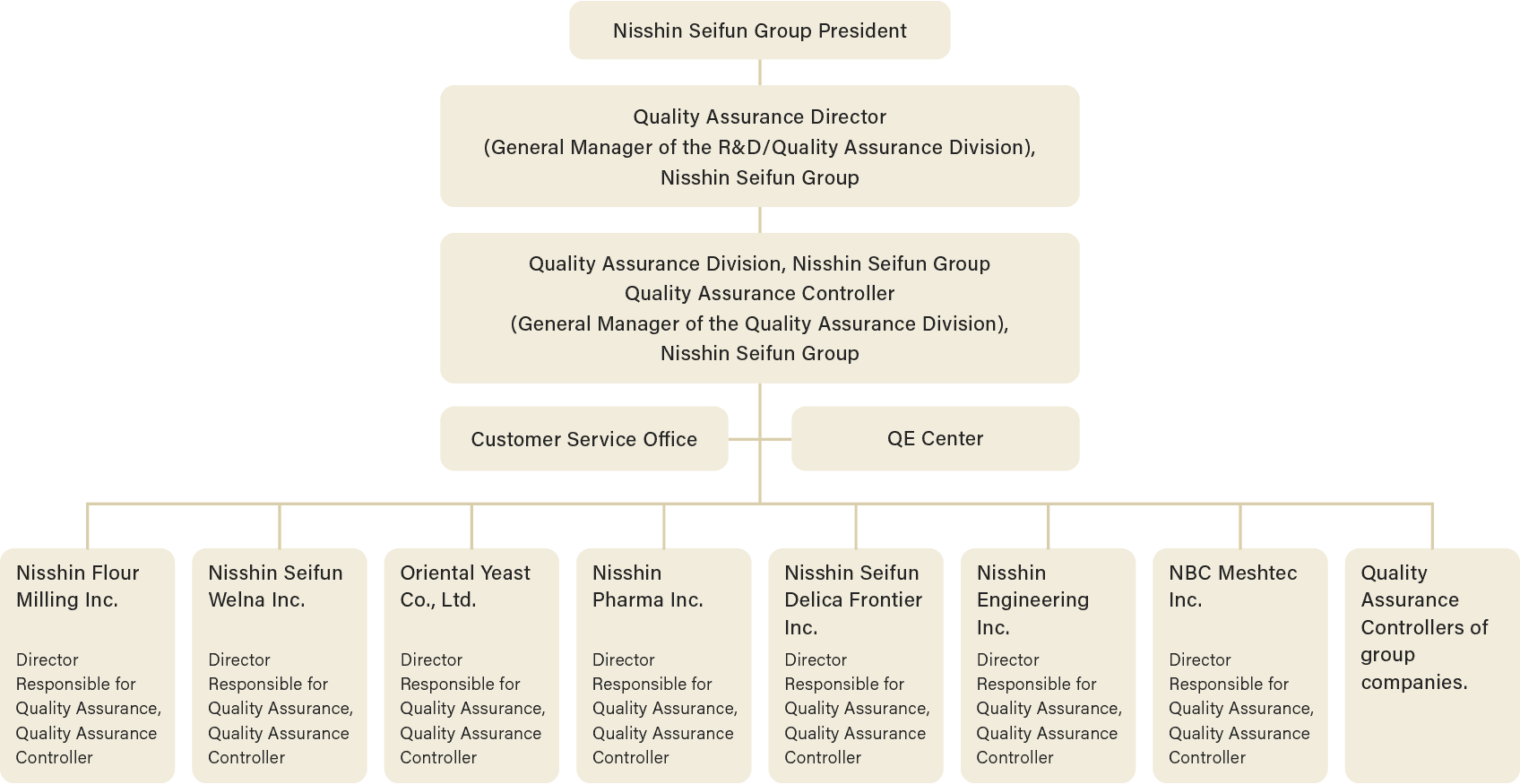
-
2
Quality Assurance Controller system
The Nisshin Seifun Group’s core philosophy on quality assurance is that in order to create safe products that consumers can enjoy with confidence, we need to ensure quality from the viewpoint of consumers. We have put this philosophy into practice by appointing Quality Assurance Controllers in the head offices of business companies and at manufacturing facilities to implement quality assurance activities independently from production units.
-
Quality Assurance Controllers (QAs)
Quality Assurance Controllers are responsible for decision-making, reporting, and educational activities.
- The decision-making role of Quality Assurance Controllers involves determining whether products shipped from each factory meet the required quality standards from the viewpoint of consumers, as people who consider themselves accountable to consumers. They also check the appropriateness of all actions at every stage from production through to storage and distribution.
- Quality Assurance Controllers report their decisions directly to factory general managers and the General Manager of the Quality Assurance Division.
- In their educational role, Quality Assurance Controllers run educational programs designed to maintain and improve the level of quality assurance systems.
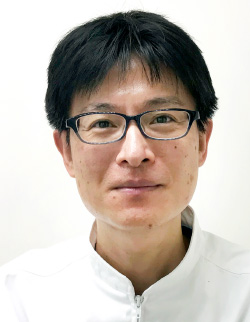
Tsuneo HironakaNisshin Flour Milling Inc. Higashinada Plant
The educational activities I carry out at the plant include monthly workplace meetings in which we hold “hazard prediction training (Quality Kiken Yochi).” This involves looking at recent cases experienced at both our sites and other companies and then considering the causes and countermeasures. This enhances the awareness of employees regarding food safety by having each of them think about cases and then share their opinion. I plan to further develop and enhance our activities going forward by holding this training online. This has the advantage of being more accessible to employees by enabling them to participate at whatever time is convenient and by implementing this in tandem with conventional sessions at workplace meetings, I hope to generate synergistic effects.
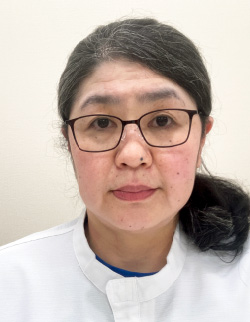
Toshie NamikiOriental Yeast Co., Ltd. (QA of Pany Delica)
As a Quality Assurance Controller, my role is to inspect all the processes at the plant from the standpoint of whether I can explain things accurately to the consumer. Also, as part of our educational activities, I offer my realizations through work-site observation to workers on site, about things that I think are good or that make me uneasy. Through this communication, I’m encouraging the building of a consumer-orientated quality assurance culture among employees on the site and receiving frank feedback from workers, such as whether current work rules are reasonable for them. My goal is to maintain a quality assurance structure based on two-way communication, rather than top-down rules.
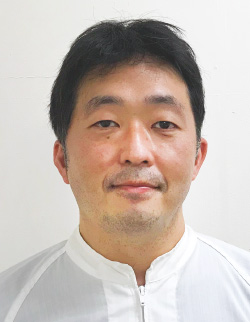
Makoto OnodaNisshin Seifun Premix Inc. Nagoya Plant
When approaching my work as a Quality Assurance Controller, I always try to get an accurate understanding of each situation by gathering information based on the “Three Reals Philosophy (Sangen Shugi),” which involves going to the actual place and seeing the actual part and the actual situation. I then make assessments based on this situational understanding, starting by considering whether I can truly explain to the consumers that our products are safe and whether they will accept my explanation. In this way, I strive to ensure that consumers receive better and more reliable products. I report the results of my assessments to the plant manager and the general manager of Quality Assurance Department at headquarters in an accurate and timely manner to facilitate the sharing of correct information throughout the company, checking my decision for any mistakes.
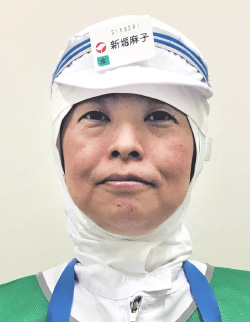
Asako ShinboriTokatsu Foods Co., Ltd. Tsuzuki Factory
I make product release decisions every day based on our top priority of "being able to explain to our consumers that our products are safe”. Communication with site workers is what I keep in mind during patrolling around the plant. I try to get information from their findings and perceptions through their daily operation and I work hard to improve various problems as soon as possible. As half of the employees are foreign nationals, we make multi-language postings and video training tools in an easy visual understanding way, which leads our quality improvement activities by all employees.
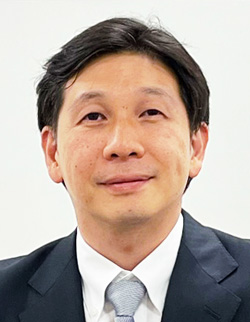
Ryota NobukiyoNisshin Seifun Turkey Makarna Ve Gida Sanayi Ve Ticaret A.S.
I am in charge of quality control and assurance at the pasta plant in Turkey. Having Japanese consumer in my mind, I always seek to produce the highest quality product. We, with all our local staff, are engaged in daily production, hoping that our products bring smiles and happiness to the people who enjoy meals with their families and loved ones. Turkey is known for its high quality wheat and we carefully select safe and tasty wheat out of it and produce high quality pasta by highly controlled manufacturing process. After carrying out rigorous inspection of our products in Turkey, I believe our responsibility for the product continue until they arrive at consumers. Though I’m far away from Japan, I always imagine each consumer’s "Delicious" smile and continue to make further improvements of our quality of products.
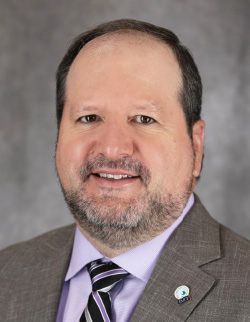
Ron GalleMiller Milling Company
Today’s customers and consumers expect food that doesn’t just meet government regulations, they expect food to be safe, reliable, and nutritious. Producing foods that meet these expectations is a foundation of the Nisshin Seifun Group. Our commitment to quality and food safety encompasses the entire product life cycle – from product design and development, through the production process and extending to the delivery of products and services to the customer. All processes and management systems are monitored, measured, and reviewed to continually improve product quality and ensure customer satisfaction and confidence. The basis of our business is built on trust. Food safety, quality and reliability are key components of building trust with our customers and consumers.
-
3
Safety Assessment and Screening of Raw Materials, Products, and Premiums, etc.
Highly qualified staff in business companies in the Nisshin Seifun Group conduct safety reviews of new and existing raw materials, products, premiums, and other items. Safety screening is also carried out at the parent company’s Quality Examination (QE) Center.
-
Safety review
Before selecting new raw materials, products, premiums, or other items, business companies in the Nisshin Seifun Group conduct safety reviews covering regulatory compliance, hazards, universal design compliance, environmental soundness, labeling, and various other criteria. These reviews are conducted by staff with advanced technical knowledge. Only items that pass will be accepted for use.
Products that are already on the market are also subject to ongoing safety reviews to ensure that there are no environmental issues or problems with the raw materials or production processes used, and to check compliance with the safety standards established at the design stage.
QE Center
The task of the QE Center is to conduct checks based on scientific criteria to confirm the safety of all new raw materials, products, premiums, and other items approved through safety reviews conducted by business companies. QE Center Staff use advanced equipment to conduct a wide range of analyses, including tests to detect residual pesticides, food additives, food poisoning bacteria, allergens, genetic material, radioactive substances, and contaminants. Final decisions on whether or not to use or sell each item are based on the results of these analyses. The QE Center was the first unit of a Japanese food manufacturer to obtain ISO17025 certification for pesticide analysis. Since then, it has also obtained certification for microbial testing and radioactivity measurement, enabling it to conduct high-precision analyses as one of the few organizations in the industry with expertise in this area.
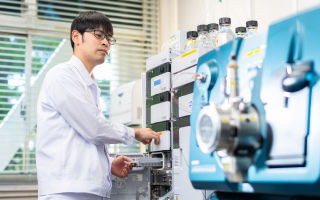
QE Center Checking Raw Materials
Raw materials undergo safety checks before their selection for use in our products, and after procurement. Pre-selection checks involve the following three steps.
- Before the safety review, development and safety management staff visit the raw material supplier to check that the product complies with the standards.
- Samples of the product are extracted for safety analyses.
- A standard document or warranty is obtained from the supplier to certify that the raw material supplied meets the standards.

Wheat is grown in fields covering vast areas. After we start to procure a new raw material, we continue to check its safety through sampling tests based on a yearly schedule. Depending on the attributes and risk factors of each raw material, we carry out the following tests.
- Residual pesticide analyses
We obtain samples for each item and production area at the start of the harvest period. We determine which pesticide tests to implement based on the pesticides used, test results from quarantine stations, and records of previous violations. - Allergen analyses
To protect food allergy sufferers from adverse health consequences, we conduct analyses for specific raw materials for which there are labeling requirements. - Food additive analyses
We decide which additives to test for according to records of previous violations and other data. We take particular care to test for additives that are permitted overseas but prohibited or restricted in Japan.
We also conduct additional safety checks, including microbial and contaminant testing and analyses to detect mold and heavy metals.
Labeling Checks
Our product labels clearly state safety and quality information, including ingredients and “best before” dates. We thoroughly check the content of our labels, both to ensure compliance with Japan’s Food Labeling Act and Act against Unjustifiable Premiums and Misleading Representations, and also to avoid wording that could be misunderstood by consumers.
In addition to checks during safety review meetings at individual business companies, the group parent company’s Customer Service Office, Legal Division, Intellectual Property Division, and Quality Assurance Division also verify the appropriateness of label content from their various perspectives and provide feedback to business companies.
Also, during Quality Month (November), we hold workshops on food labelling for the personnel responsible for labelling at each Group company to raise awareness and provide them with the knowledge needed to practice appropriate labelling.
-
4
Ensuring Traceability
We ensure traceability by maintaining records at each stage from the acceptance of raw materials through to manufacturing, storage, and logistics.
-
Traceability
We record data relating to the raw materials used and manufacturing, storage, logistics, and other processes as the basis for traceability. This approach allows us to check data reliability quickly and effectively by tracing back from finished products to raw materials, and forward from raw materials to finished products. In the unlikely event of a problem, we can immediately identify the cause and initiate a product recall.
-
5
Food Defense
We have established the Nisshin Seifun Group Food Defense Guidelines as a precaution against deliberate attempts to contaminate our products. These guidelines are the basis for a consistent group-wide approach to product security.
-
Food Defense Guidelines
Under the basic policy outlined below, we have established security standards for employees, production areas, sites, buildings, and storage facilities.
(1) We will endeavor to create pleasant working environments for our employees while raising their security awareness through education and training.
(2) We will strengthen access controls to allow monitoring and tracing of personnel at sites, in buildings, and in production areas.
(3) We will install cameras where required to enhance our capacity to prevent deliberate attempts to contaminate our products, and to support tracing.
We will regularly conduct self-inspections to ensure that operations are being managed according to these guidelines.
We will update the guidelines as required in response to changes in the social environment.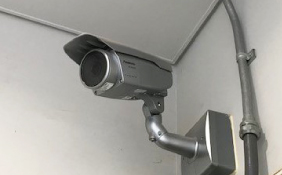
Access control camera 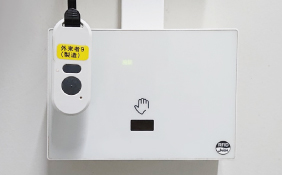
IC tag reader 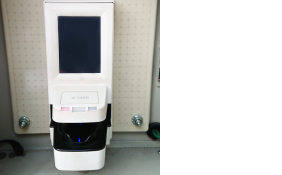
Vein recognition system -
6
Quality Assurance Training
We provide quality assurance training for all employees with the aim of raising employee awareness of product safety. Through this training, we help employees to develop and consolidate their understanding of quality assurance from the viewpoint of consumers.
-
Training for All Employees
Employee awareness of quality assurance is essential to food safety. We enhance that awareness by providing quality assurance training each year for all officers and employees working in R&D, production, and sales at our business companies in Japan and overseas. This training covers a wide range of food safety knowledge, including general hygiene management, the standards and rules of the Nisshin Seifun Group, changes in industry and government standards, and related regulations Yearly training for Quality Assurance Controllers also includes food safety lectures presented by outside instructors.
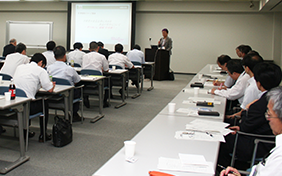
Quality assurance training (Japan) 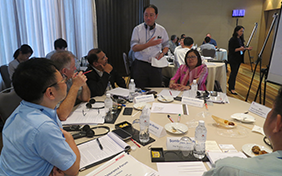
Quality assurance training (overseas) 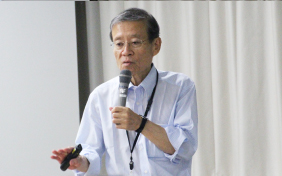
A lecture by Mr. Mitsuo Kato of Food Design Co., Ltd. -
7
Nisshin Quality Assurance Audits, Manufacturing Environment Monitoring
All manufacturing and storage facilities undergo Nisshin Quality Assurance Audits (NQ Audits) as part of our commitment to maintaining and improving quality assurance. We also monitor the status of hygiene control processes in our manufacturing environments.
-
Nisshin Quality Assurance Audits (NQ Audits)
The auditors appointed by Quality Assurance Director conduct quality assurance audits of all head offices and manufacturing and storage facilities of Group companies using the NQ Audit checklist developed by the Nisshin Seifun Group. Aspects covered in the checklist include requirements under food safety management standards and related laws and regulations (Food Sanitation Act, Food Labeling Act, and Act against Unjustifiable Premiums and Misleading Representations), as well as case studies of problems at group facilities in Japan and overseas, and the viewpoint of consumers.
The purpose of the audits is to identify not only existing problems, but also potential causes of future problems, leading to the early discovery and rectification of risk factors.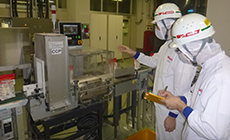
Nisshin Quality Assurance Audit (NQ Audit) Manufacturing Environment Monitoring
The QE Center uses scientific data to check the status of hygiene management systems in the factories where the Nisshin Seifun Group’s products are manufactured. Monitoring includes microbial testing through checks for falling bacteria, swab tests, and product sampling. ATP tests are used to check the standard of production line cleaning, while chemical tests are carried out to detect contaminants. Monitoring results are fed back to business companies for use in maintaining and enhancing their manufacturing environments.
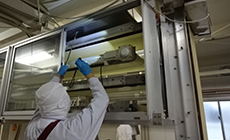
Checking production process environments 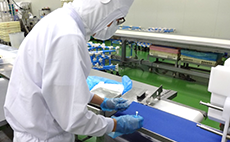
Taking a swab test from a conveyor belt Third-party Inspections
We employ independent external inspection organizations to check the appropriateness of our quality assurance audits (NQ audits) by examining product safety measures in our factories.
-
8
Responding to Significant Quality Incidents
Employees report any significant quality incidents to top management without delay. Top management immediately establishes a task force to take appropriate and timely action.
-
Call Center Reporting System
In the event of an emergency situation that could impact on the business operations of the Nisshin Seifun Group, such as a fire, natural disaster, or accident, or an abnormal situation that could be reported publicly, employees must first contact the Call Center to make an initial report about the situation. Reporting is required not only through the Call Center but also via the corporate administration system. In the case of situations affecting product quality and safety, reports must also be submitted through a third route based on the quality assurance organization.
Call center reporting system

Significant Quality Incident Task Force
When a problem is reported, top management will consider the situation and decide whether or not to establish a task force. In the case of a serious issue relating to product safety and quality, a Significant Quality Incident Task Force will be established and will immediately begin to ascertain details, decide whether to recall products, investigate the causes, and implement recurrence prevention measures.
-
9
Using Customer Feedback
Product feedback or requests submitted to the Customer Service Office by consumers are reviewed by staff in related areas, such as quality assurance, development, and production, and used in product improvement and the development of new products.
-
Customer Service Office
As part of its commitment to customer satisfaction and trust, the Nisshin Seifun Group established the Customer Service Office as a contact point for consumer inquiries and feedback about home-use products.
Each year the Customer Service Office receives over 10,000 calls from consumers. This input is shared with related units in areas ranging from R&D to production and sales through the CHORUS response system. In addition to providing a timely response to customer needs, these units also use this feedback to develop products from a consumer’s perspective. FAQ dialogues are also provided on the Nisshin Seifun Welna website in categories based on products and the purposes for which they are used.
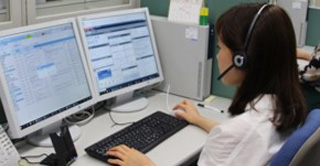
Customer Service Office Linking Consumer Feedback to Product Improvements
When customer feedback is received, the units concerned check the actual products and continually monitor the situation, including reviews of completed cases.
The Quality Assurance Director convenes Customer Feedback Review Meetings with staff from the Corporate Communications Division, Customer Service Office, Quality Assurance Division, and production units to review the number and details of cases over the previous week and study at investigation reports. Any cases that resulted in customer dissatisfaction are checked and shared at the Customer Feedback Review Meeting.
Consumer feedback and opinions about products that are already on the market are also reviewed at monthly Quality Improvement Meetings attended by staff from quality management, quality assurance, production, and production development units. This valuable information is used to improve products and services.
By knowing our customers and sharing information, we are able to fulfill our commitment to providing timely and sincere responses to all customer feedback.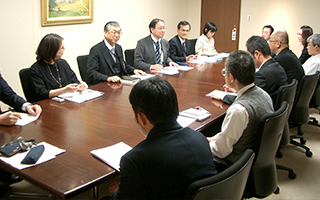
Customer Feedback Review Meeting Consumer Relations (CR)
In order to accurately assess consumer awareness and social trends, make timely decisions and implementation measures that Nisshin Group should prepare for, we have appointed the General Manager of the General Affairs Headquarters as the Consurmer Relations general manager. We gather and exchange information with the Consumer Affairs Agency and consumer organizations, and shares the information with our group companies.
As part of consumer communication activities, we go to elementary and junior high schools to give classes about wheat flour, set up a booth at consumer events sponsored by government agencies and hold factory tours for consumer groups and other organizations.
As we launce many kinds of product into the market, Nisshin Seifun Group interacts with many government agencies and organizations. To ensure an unified response throughout our group companies, we appoint CR officers at group headquartors and group companies. -
10
Using International Management Systems
We are continually enhancing and strengthening our product safety systems by acquiring and maintaining certification under international management systems.
-
Using Food Safety Management Systems and Quality Management Systems
We are preparing for global business expansion by continually strengthening our quality assurance structures under international management systems. By achieving and maintaining certification under various systems, including the ISO9001 quality management system, the ISO22000, FSSC22000 and JFS-C food safety management systems, and the ISO13485 quality management system for medical devices, we are continually improving our product safety systems.
Management systems and certified facilities of Nisshin Seifun Group







